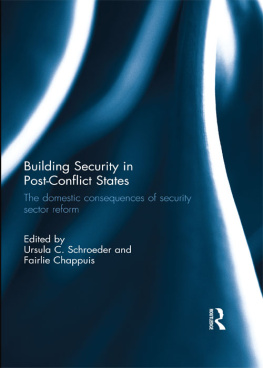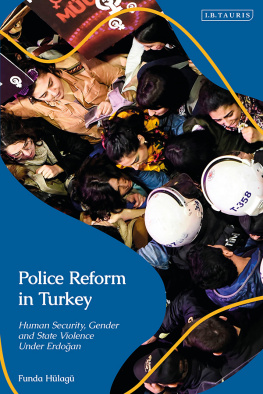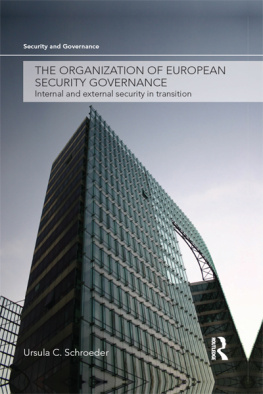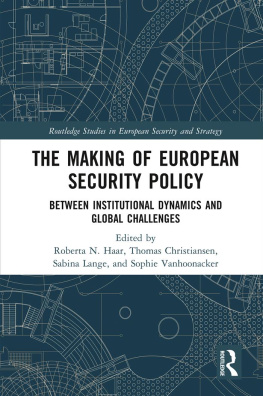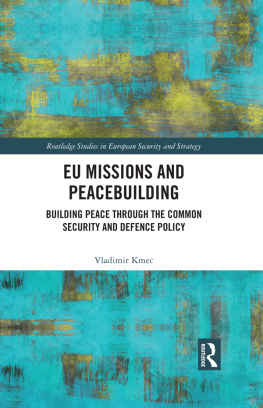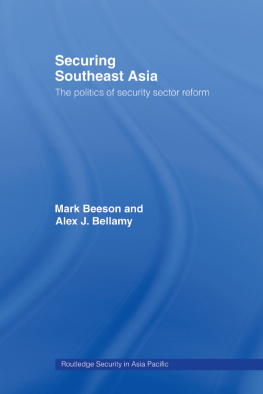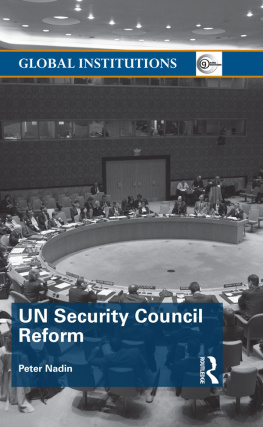The European Union as an Actor in Security Sector Reform
This book critically analyzes the European Unions role in Security Sector Reform (SSR), a topical issue with regards to European security. While the literature on SSR has increased significantly in the past decade, too little remains in the way of comparative analyses of SSR case studies that are geared towards theory development. This collection strives to push the SSR literature in that direction. One key question it focuses on is whether the EU pursues a holistic approach vis--vis SSR. Another question the book addresses is why and how the EU activities towards SSR in conflict management, peacebuilding and statebuilding have produced a wide variety of outcomes that range from the failure to reform any or all of the subset of security sectors (police, justice, military, etc.) to complete and integrated reform.
The book encompasses all relevant cases of SSR in terms of the financial, human and political resources involved at the EU level. Cases are drawn from the Balkans (Kosovo, Bosnia-Herzegovina), Africa (Democratic Republic of Congo), the Middle East (Palestinian Territories), Post-Soviet Space (Georgia) and Asia (Aceh, Indonesia). The end product is a welcome contribution to the literature, providing both an empirically and a theoretically grounded approach to the study of SSR.
This book was originally published as a special issue of European Security.
Oya Dursun-zkanca (Ph.D., University of Texas at Austin, USA) is an Associate Professor of Political Science at Elizabethtown College, PA, USA. She serves as a Visiting Fellow at Research on South Eastern Europe at London School of Economics, UK. Her research interests include transatlantic security, Security Sector Reform, peacebuilding and Turkish foreign policy.
The European Union as an Actor in Security Sector Reform
Current Practices and Challenges of Implementation
Edited by
Oya Dursun-zkanca
First published 2014
by Routledge
2 Park Square, Milton Park, Abingdon, Oxon, OX14 4RN
Simultaneously published in the USA and Canada
by Routledge
711 Third Avenue, New York, NY 10017
Routledge is an imprint of the Taylor & Francis Group, an informa business
2014 Taylor & Francis
All rights reserved. No part of this book may be reprinted or reproduced or utilised in any form or by any electronic, mechanical, or other means, now known or hereafter invented, including photocopying and recording, or in any information storage or retrieval system, without permission in writing from the publishers.
Trademark notice: Product or corporate names may be trademarks or registered trademarks, and are used only for identification and explanation without intent to infringe.
British Library Cataloguing in Publication Data
A catalogue record for this book is available from the British Library
ISBN13: 978-0-415-71776-2
Typeset in Times New Roman
by Taylor & Francis Books
Publishers Note
The publisher accepts responsibility for any inconsistencies that may have arisen during the conversion of this book from journal articles to book chapters, namely the possible inclusion of journal terminology.
Disclaimer
Every effort has been made to contact copyright holders for their permission to reprint material in this book. The publishers would be grateful to hear from any copyright holder who is not here acknowledged and will undertake to rectify any errors or omissions in future editions of this book.
Contents
Clare Short
Oya Dursun-Ozkanca and Antoine Vandemoortele
Giovanni Faleg
Maxime H.A. Lariv
Antoine Vandemoortele
Arnout Justaert
Oya Dursun-Ozkanca and Katy Crossley-Frolick
Dimitris Bouris
Greg Simons
Simone Tholens
The chapters in this book were originally published in European Security, volume 21, issue 2 (May 2012). When citing this material, please use the original page numbering for each article, as follows:
Chapter 1
The European Union and Security Sector Reform: current practices and challenges of implementation
Oya Dursun-Ozkanca and Antoine Vandemoortele
European Security, volume 21, issue 2 (May 2012) pp. 139160
Chapter 2
Between knowledge and power: epistemic communities and the emergence of security sector reform in the EU security architecture
Giovanni Faleg
European Security, volume 21, issue 2 (May 2012) pp. 161184
Chapter 3
From speeches to actions: EU involvement in the war in Afghanistan through the EUPOL Afghanistan Mission
Maxime H.A. Lariv
European Security, volume 21, issue 2 (May 2012) pp. 185201
Chapter 4
Adaptation, resistance and a (Re)turn to functionalism: the case of the Bosnian police restructuring process (20032008)
Antoine Vandemoortele
European Security, volume 21, issue 2 (May 2012) pp. 202218
Chapter 5
The implementation of the EU security sector reform policies in the Democratic Republic of Congo?
Arnout Justaert
European Security, volume 21, issue 2 (May 2012) pp. 219235
Chapter 6
Security sector reform in Kosovo: the complex division of labor between the EU and other multilateral institutions in building Kosovos police force
Oya Dursun-Ozkanca and Katy Crossley-Frolick
European Security, volume 21, issue 2 (May 2012) pp. 236256
Chapter 7
The European Unions role in the Palestinian Territories: state-building through Security Sector Reform?
Dimitris Bouris
European Security, volume 21, issue 2 (May 2012) pp. 257271
Chapter 8
Security Sector Reform and Georgia: the European Unions challenge in the Southern Caucasus
Greg Simons
European Security, volume 21, issue 2 (May 2012) pp. 272293
Chapter 9
Which and whose authority? EU support to security governance in Aceh
Simone Tholens
European Security, volume 21, issue 2 (May 2012) pp. 294309
Please direct any queries you may have about the citations to clsuk.permissions@cengage.com
This very useful volume examines the European Unions record of implementation of Security Sector Reform (SSR) in a number of conflict and post-conflict settings. The list of cases examined includes Kosovo, Bosnia, the Democratic Republic of Congo (DRC), the Occupied Palestinian Territories, Afghanistan, Georgia and Aceh. We have only to read this list to be aware that the task in front of the EU is difficult, and to fear that the motives in its involvement might be mixed.
Having played my part in proposing the idea of Security Sector Reform as a way of bringing to oppressed and poor people the security and development that they crave, I have become concerned that the concept might be deployed as a cover for interventions that focus less on the needs of local people and more on Western security interests.
This would be my concern, for example, when considering the Security Sector Reform efforts in the Occupied Palestinian Territories and in Afghanistan. In addition, I have been concerned for a considerable time that the largest UN peacekeeping operation in the world in the Eastern DRC has been so hopelessly ineffective. This means continuing gross suffering for the local people, and a major undermining of the authority of the UN. The EU contribution to Security Sector Reform in the DRC may be in danger of adding a camouflage of ineffective activity to this failure.



